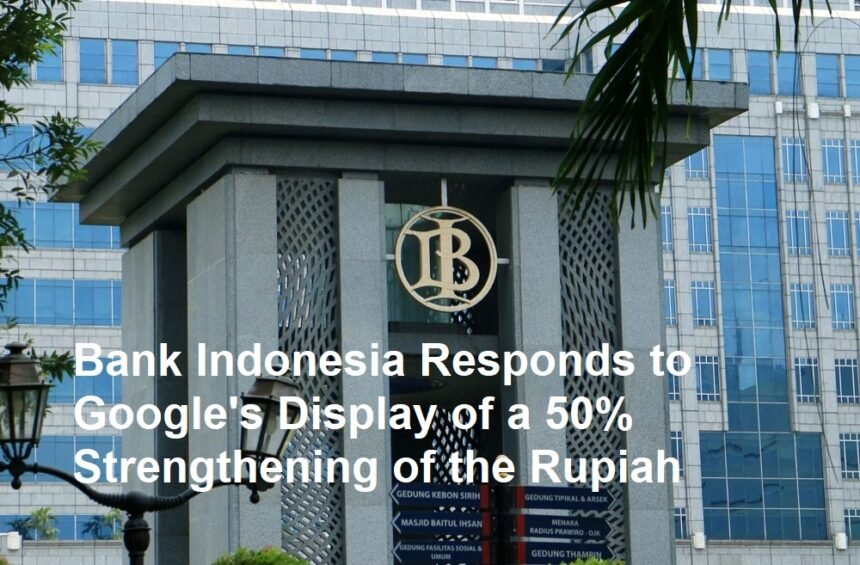In a surprising turn of events that has stirred both financial markets and public debate, Bank Indonesia has issued an official statement in response to reports that Google is displaying a reinforcement of the rupiah by as much as 50%. The claim, which has rapidly circulated on social media and various financial news outlets, suggests that the Indonesian rupiah is significantly stronger than previously reported—a scenario that experts and officials say is highly unlikely given current economic indicators.
According to several online sources, Google’s currency conversion tool recently showed the rupiah’s value as being 50% stronger against major currencies such as the U.S. dollar and the Euro. This sudden display of an unusually strong rupiah has raised immediate questions among investors, traders, and the general public. However, Bank Indonesia, the nation’s central bank, has firmly denied any such dramatic improvement in the currency’s performance.
In a press release issued earlier this week, Bank Indonesia stated, “There has been no significant change in the fundamentals of the rupiah that would justify a 50% strengthening against major global currencies. We believe that the figures displayed on certain online platforms, including Google, are the result of a technical error or data misinterpretation.” The central bank emphasized that its own monitoring systems and official exchange rate data do not reflect such a dramatic shift in the rupiah’s value.
The official response from Bank Indonesia comes at a time when the country’s currency market remains relatively stable, with only moderate fluctuations observed in recent months. Analysts note that while the rupiah has shown gradual improvement due to a combination of prudent monetary policy, improved export performance, and higher foreign investment inflows, a 50% jump is unprecedented. “Such an extreme change in exchange rates would require massive underlying economic changes, which we have not seen,” explained Dr. Rizal Hamzah, a senior economist at a leading Indonesian financial institution. “It is likely that there is a glitch in the data aggregation or a miscommunication in the information provided by third-party sources.”
Financial experts also warn that the erroneous display could have adverse effects on market sentiment and investor behavior if left unaddressed. A perceived 50% strengthening of the rupiah might encourage speculative trading, distort investor expectations, and even impact decisions by multinational companies considering market entry or investments in Indonesia. “Investors rely on accurate and timely information when making financial decisions,” said Anita Suryani, a currency market analyst. “A sudden, unsubstantiated claim of such a dramatic currency shift can create confusion and potentially lead to volatility in both domestic and international markets.”
In response to the public outcry, Bank Indonesia has initiated discussions with major tech companies, including Google, to investigate the source of the incorrect information. Officials are working to determine whether the error lies in the data feeds provided by third-party financial services or if it is a result of an internal processing error within Google’s systems. The central bank has assured the public that it will work closely with these companies to ensure that all displayed exchange rates are accurate and reflective of the true market conditions.
Furthermore, Bank Indonesia reiterated its commitment to transparency in monetary policy and financial reporting. “We remain dedicated to providing clear, reliable information to the public,” the statement read. “It is crucial that both domestic and international stakeholders have confidence in the data regarding our currency and overall economic health.”
While the investigation continues, industry observers suggest that this incident serves as a reminder of the importance of cross-verifying financial data from multiple reputable sources. In an increasingly digital world, where information is disseminated rapidly and widely, the potential for technical errors remains a challenge. Investors and consumers alike are encouraged to consult official statements from regulatory bodies like Bank Indonesia and other trusted financial institutions for accurate data.
In conclusion, the claim that the Indonesian rupiah has strengthened by 50% is currently being attributed to a technical error on Google’s part. Bank Indonesia’s prompt response and ongoing investigation underscore the central bank’s proactive approach in maintaining market stability and ensuring the reliability of financial information. As the situation develops, stakeholders are advised to monitor official channels for updates and clarifications.













